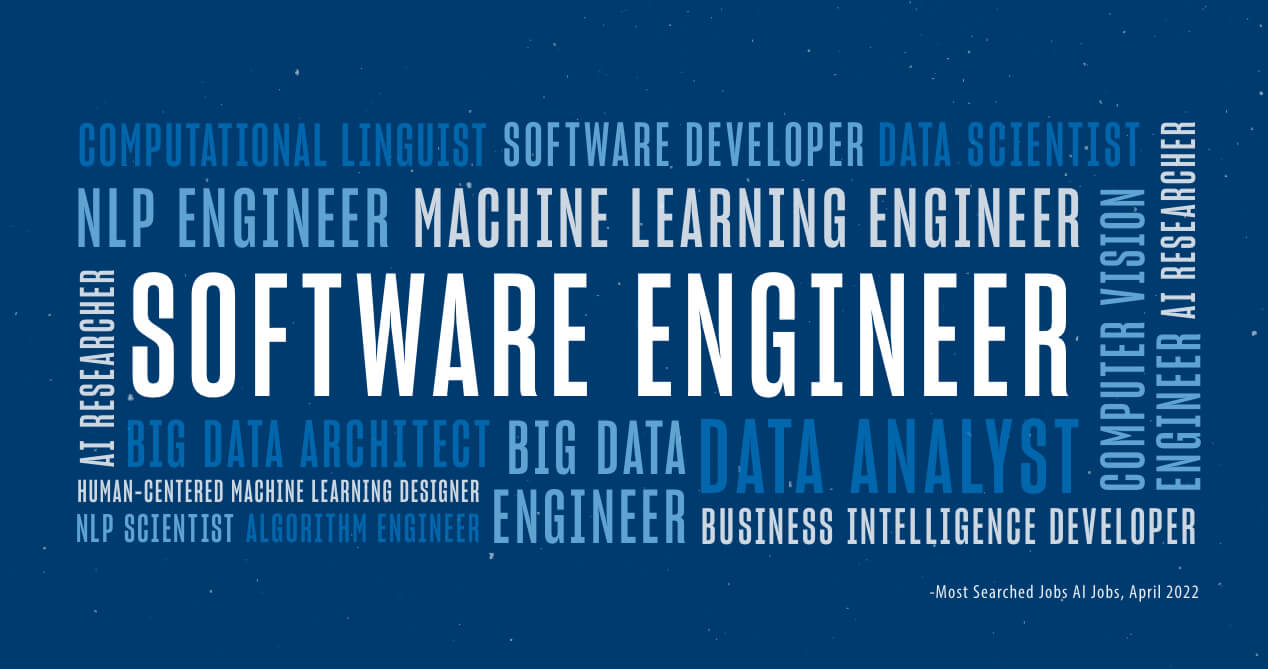Data Analyst. Machine Learning Engineer. Business Intelligence Developer. Artificial Intelligence Researcher. What do these careers have in common?
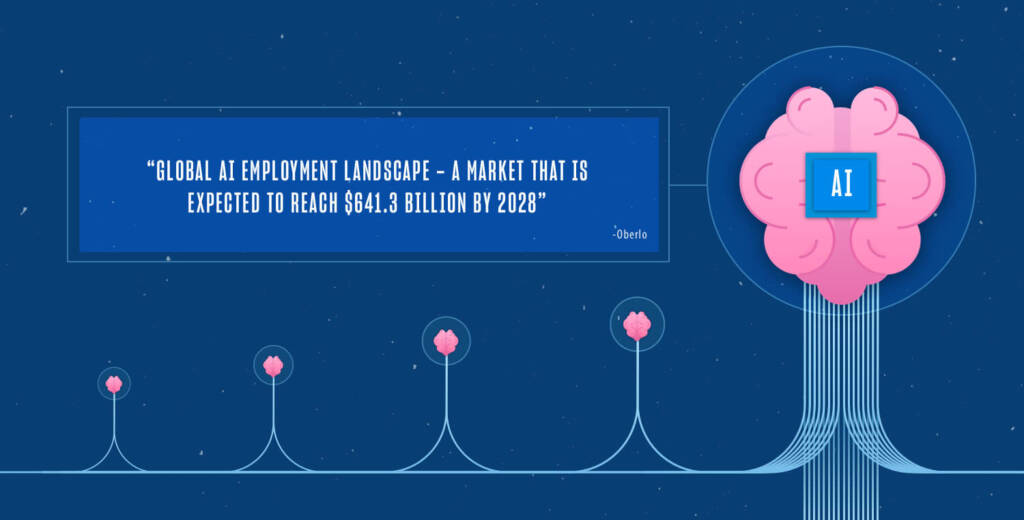
They are some of the top positions in the global AI employment landscape — a market that is expected to reach $641.3 billion by 2028, according to Oberlo.
In this career guide, we explore these top positions and compare them to the jobs that people (like you!) are searching online. Which ones are most in demand? Which ones have the most job listings? Which career possibilities have available positions but perhaps haven’t yet crossed your radar?
Let’s find out.
The 15 Artificial Intelligence Jobs We Analyzed
Artificial Intelligence Job Search Infographic
The 15 Artificial Intelligence Jobs We Analyzed
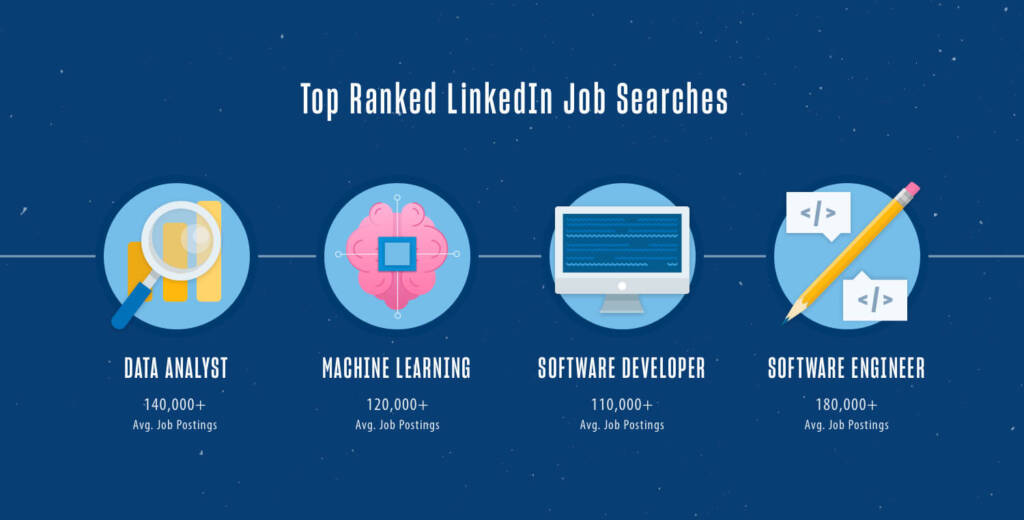
These positions are the most popular Google searches related to the artificial intelligence industry. Please note they are listed alphabetically and are not ranked in any way.
- Algorithm Engineer: As ZipRecruiter explains, this position revolves around “researching, writing, and performance testing algorithms.” Algorithms use data to create reports or other types of information, so you will first need to create project goals.
- AI Researcher: Similar to an Algorithm Engineer, an AI Researcher explores ways of using data to ask questions and find solutions powered by artificial intelligence, according to Forbes. This can include developing new AI algorithms.
- Big Data Engineer: The term “big data” is defined as “massive, complex data sets that traditional data management systems cannot handle.” Data engineers are mainly responsible for ensuring that the data used to drive informed strategies, decisions, and actions is production-ready — a process that may consist of formatting, scaling, resilience, and security.
- Big Data Architect: This type of position typically deals with a business or organization’s strategy and includes working with data model designs, standards, and data analytics systems.
- Business Intelligence Developer: This position is an “engineer who uses business intelligence software to interpret and display data for an organization,” according to Indeed. Responsibilities may include creating business intelligence solutions, resolving issues, working with other analysts and developers to compile data, and translating that information and related findings to other parts of a company.
- Computer Vision Engineer: Also known as a CV Engineer, this position “uses software to handle the processing and analysis of large data populations in an effort to support the automation of predictive decision-making through visuals.” Responsibilities include working with large amounts of data and statistics and researching machine learning and computer vision systems.
- Computational Linguist: A person in this type of position researches and creates solutions and processes that help machines understand human language. This includes voice-to-text applications, smart assistants, and more.
- Data Analyst: Data analytics is defined as qualitative and quantitative techniques and processes used to improve productivity and business performance. Professionals in these positions evaluate specific data to generate insight for their employers.
- Data Scientist: These types of scientists use a combination of advanced skills in coding, math, statistics, analytics, and machine learning to create data-driven insights and solve problems for their company or organization.
- Human-Centered Machine Learning Designer: A person in this position is responsible for the “design, development, and deployment of information systems that learn from and collaborate with humans in a deep, significant way.”
- Machine Learning Engineer: ML engineers are typically responsible for building and managing platforms for machine learning projects.
- NLP Engineer: A Natural Language Processing (NLP) Engineer works with speech patterns and AI speech recognition, creating sophisticated systems and computers that can understand what humans say.
- Natural Language Processing (NLP) Scientist: According to Great Learning, an NLP Scientist transforms “natural language data into useful features using NLP techniques to feed classification algorithms.”
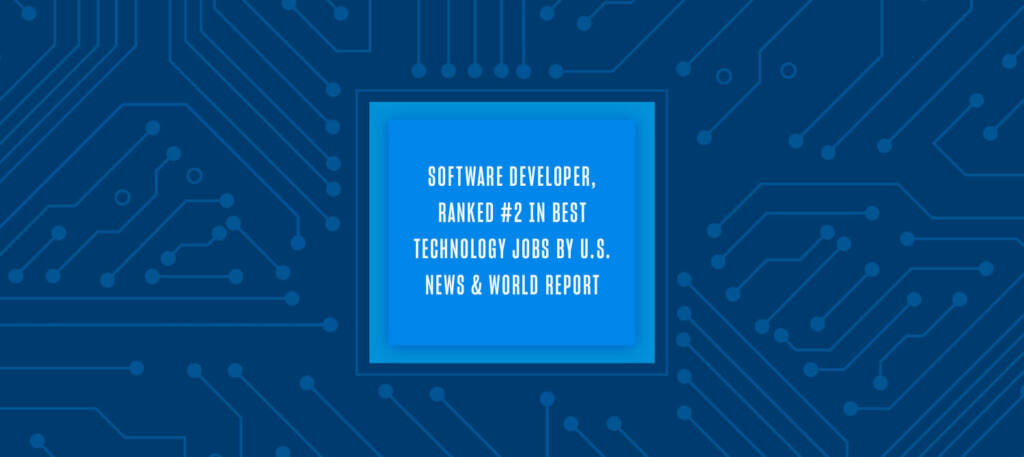
- Software Developer: Ranked #2 in Best Technology Jobs by U.S. News & World Report, a Software Developer’s responsibilities may include designing different technologies, working on client projects, writing code, or improving code for pre-existing programs.
- Software Engineer: These types of engineers help develop and build computer systems software and applications software. Applications Engineers and Systems Engineers are subsets within this career.
Artificial Intelligence Job Search Infographic
We first compiled the monthly keyword Google searches for the most popular artificial intelligence positions. We then compared that data to the average number of monthly job postings for each particular position on LinkedIn. The data was compiled over a 3-month period (February, March and April 2022).
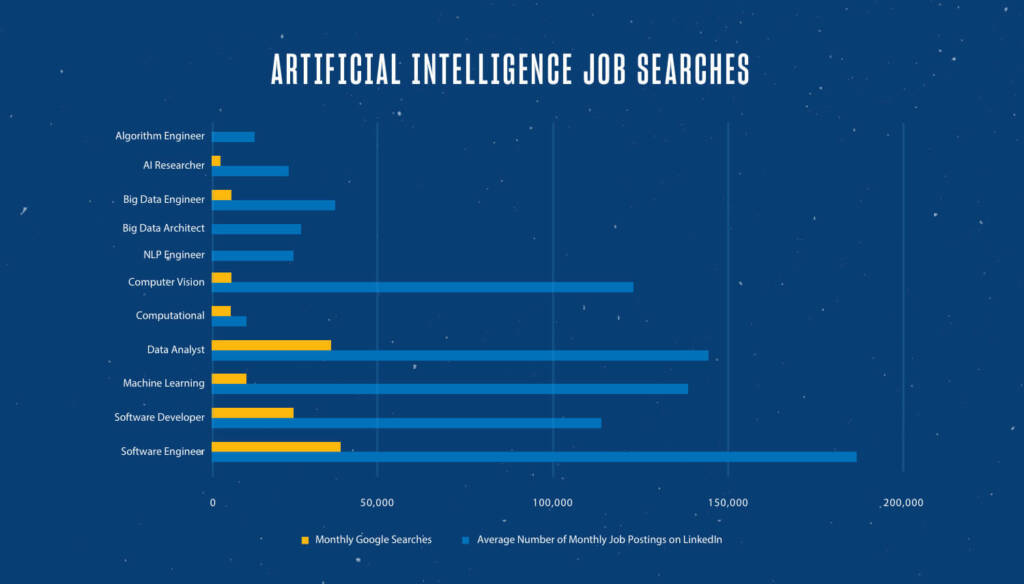
In many cases, the LinkedIn job postings far exceed the number of monthly Google searches, especially for Computer Vision Engineers, Machine Learning Engineers, and Software Engineers. It’s important to note that some positions may overlap and include postings that show up for more than one search. For example, a search for Big Data Engineer shows results with some Data Scientist and Software Engineer positions.
You will also likely find other positions in your search, such as Robotics Scientist, Engineering Data Scientist, Artificial Intelligence Solution Architect, Artificial Intelligence Developer and Robotics Engineer — among many others.
Regardless of the overlap, if you’re interested in starting or advancing a career in artificial intelligence it’s safe to say that there are no shortage of positions — and these careers are a good place to start.
Download Our Comprehensive Checklist for Choosing the Right AI Degree Program
—
This report was brought to you by the University of San Diego — a highly regarded industry thought leader and education provider that offers a 100% online Master of Science in Applied Artificial Intelligence. This degree program features practical, cutting-edge curriculum taught by expert instructors who share insights drawn from highly relevant industry experience.
